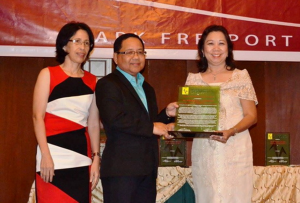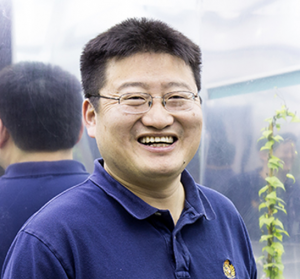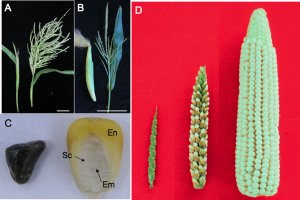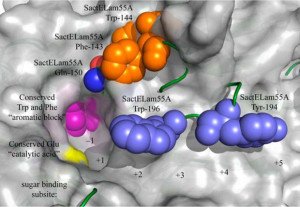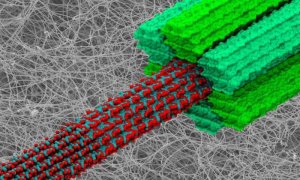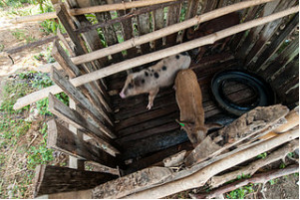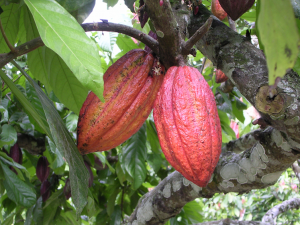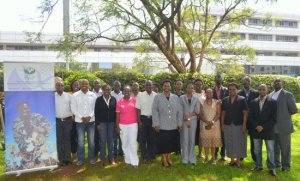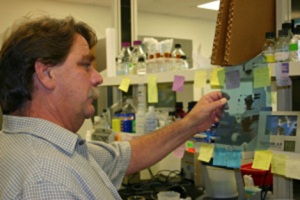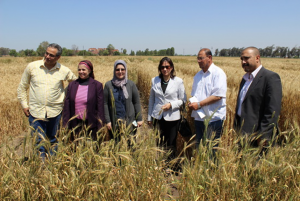The Federation of Crop Science Societies of the Philippines (FCSSP) held its 23rd Scientific Conference last May 12-15, 2015 at the Stotsenberg Hotel in Clark Freeport Zone, Pampanga, Philippines. It was chaired by the Philippine Seed Industry Association Inc., co-organized by three societies (Crop Science, PhilFruits, and the Philippine Association of Plant Tissue Culture and Biotechnology), with support from the Department of Agriculture, the Pampanga State Agricultural University, among others.
Cucumber plants are not simply male or female. They can be seven different sexes, depending on a complex mix of genetic and environmental factors. Some high-yielding cucumber varieties produce only female flowers, and scientists from the Boyce Thompson Institute for Plant Research (BTI) at Cornell University in the USA, and the Chinese Academy of Agricultural Sciences (CAAS) in China, have identified the gene duplication that causes this unusual trait.
The natural history of maize began nine thousand years ago when Mexican farmers started to collect the seeds of the wild grass, teosinte. Invaluable as a food source, maize permeated Mexican culture and religion. Its domestication eventually led to its adoption as a model organism, aided in large part by its large chromosomes, ease of pollination and growing agricultural importance. Genome comparisons between varieties of maize, teosinte and other grasses are beginning to identify the genes responsible for the domestication of modern maize and are also providing ideas for the breeding of more hardy varieties.
The natural history of maize began nine thousand years ago when Mexican farmers started to collect the seeds of the wild grass, teosinte. Invaluable as a food source, maize permeated Mexican culture and religion. Its domestication eventually led to its adoption as a model organism, aided in large part by its large chromosomes, ease of pollination and growing agricultural importance. Genome comparisons between varieties of maize, teosinte and other grasses are beginning to identify the genes responsible for the domestication of modern maize and are also providing ideas for the breeding of more hardy varieties. - See more at: http://elifesciences.org/content/4/e05861#.dpufThe natural history of maize began nine thousand years ago when Mexican farmers started to collect the seeds of the wild grass, teosinte. Invaluable as a food source, maize permeated Mexican culture and religion. Its domestication eventually led to its adoption as a model organism, aided in large part by its large chromosomes, ease of pollination and growing agricultural importance. Genome comparisons between varieties of maize, teosinte and other grasses are beginning to identify the genes responsible for the domestication of modern maize and are also providing ideas for the breeding of more hardy varieties.
Researchers at the US Department of Energy (DOE) have developed and analyzed high-resolution crystal structures of an enzyme from the cellulose-degrading GH55 family. The team used a variety of techniques that resulted in the "most complete functional mapping of an entire GH family available to date."
Scientists from he Universities of Melbourne and Queensland and IBM Research have moved a step closer to identifying the nanostructure of cellulose – the basic structural component of plant cell walls that provide fibre in our diet. The insights could pave the way for more disease resistant varieties of crops and increase the sustainability of the pulp, paper and fibre industry – one of the main uses of cellulose.
Lao PDR’s northern-most province lies among cloud-covered peaks between China to the west and Vietnam to the east. The mountains here, along the eastern edge of Phongsaly province, are cut by a narrow winding pass – a trade route with Vietnam becoming more popular amid rising demand for pig meat.
Propagation of varieties of Theobroma cacao has been done through somatic embryogenesis (SE). However, low efficiencies and genotype dependence still limits propagation at commercial scales. The Pennsylvania State University's Wayne Curtis aims to use transcription factor Babyboom (BBM) to promote the transition of somatic cacao cells from the vegetative to embryonic.
Biotechnology experts from the Kenya Agricultural & Livestock Research Organization (KALRO) and the Kenya University Biotechnology Consortium (KUBICO) undertook a social media training on 15 May 2015.
The U.S. Environmental Protection Agency (US EPA) has approved Southern Gardens Citrus' application for an Experimental Use Permit under the Federal Insecticide, Fungicide and Rodenticide Act. The permit allows Southern Gardens to move forward in its development of the possible use of a spinach protein to help control the devastating citrus greening disease, or Huanglongbing (HLB).
EBIC team, Director of AGERI and researchers from AGERI and Cairo University organized a workshop at Gemiza station where there are on-going field trials of transgenic wheat plants. More than 120 farmers, researchers and students attended the workshop. The president of the Gemiza Station Dr. Hosam Eldien Awad opened the workshop with a welcome presentation followed by Dr. Shireen Assem, Director of AGERI where she presented the different activities carried out at AGERI.


 Curently online :
Curently online :
 Total visitors :
Total visitors :
